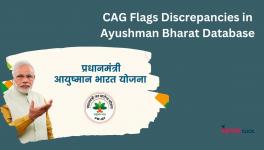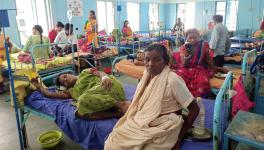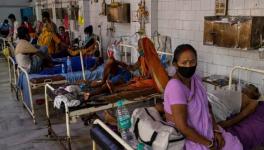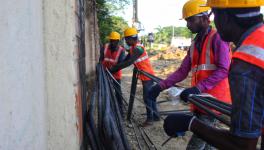Ayushman Bharat: Huge Gaps in Cost of Neonatal Care in Public and Private Hospitals, Says Paper
There were huge gaps in benefits utilised for neonatal care under the Ayushman Bharat–Pradhan Mantri Jan Arogya Yojana (AB-PMJAY) in private and public hospitals across the country, according to a paper published by a government authority. The paper analysed the utilisation of neonatal care packages under PMJAY in the Greenfield states (states where there was no insurance scheme before the implementation of PMJAY) and found that a significant majority of claims are being raised by private hospitals in these states. The Greenfield states consist of Chhattisgarh, Jharkhand, Madhya Pradesh, Uttar Pradesh, Uttarakhand, Haryana, Meghalaya, Mizoram, Bihar, Jammu And Kashmir, Himachal Pradesh, Nagaland, and the Union Territory Dadra and Nagar Haveli.
Currently, AB–PMJAY provides coverage for 10 Neonatal Care packages out of which 5 packages are most commonly used for in-patient care varying as per the severity of the baby’s condition at the time of birth.
The preliminary package that is offered is the Basic Neonatal Care Package, which costs Rs 500 per day and entails basic care for newborn babies along with the service of radiant warmers, and can be managed by the side of mother in postnatal ward without requiring admission to Special Newborn Care Unit (SNCU) or Newborn Intensive Care Unit (NICU). This is followed by the Special Neonatal Care Package that is considerably higher priced at Rs 3,000 per day, and includes services such as intensive phototherapy machines and treatment for jaundice and mild sepsis which require admission to SNCU or NICU.
Also read: Lack of Infrastructure in Govt Hospital NICUs in Peripheral Regions
The Intensive Neonatal Care Package costs Rs 5,000 per day and is a mid-range package for babies with birth weight between 1,500-1,799 grams or those requiring mechanical ventilator support for less than 24 hours, treatment for hyperbilirubinemia, seizures, major congenital malformation, cholestasis, or congestive heart failure.
The next package is the Advanced Neonatal Care Package, costing Rs 6,000 per day, for babies with birth weight more than 1,200 grams but less than 1,499 grams. The package also covers babies requiring invasive ventilator support or are diagnosed with hypoxic ischemic encephalopathy, cardiac rhythm disorders, renal failure, inborn metabolic errors, sepsis, or conditions requiring invasive ventilation for more than 24 hours. The Critical Neonatal Care Package is the most expensive package offered, at Rs 7,000 per day, for babies with birth weight less than 1,200 grams or born with either severe respiratory failure, multisystem failure, or critical congenital heart disease.
The paper observed, “The public-private spending differential is particularly noticeable in neonatal health care.” It was seen that there was a higher utilisation of the Basic Neonatal Care Package by public hospitals when compared to private hospitals. On the other hand, majority of the claims made by private hospitals were under the more expensive Advanced Neonatal Care Package. According to the data quoted in the paper, 92.62% of all claims for Basic Neonatal Care Packages were raised by public hospitals. Only 47 out of the 637 claims were raised by private hospitals.
However, for all the other packages, which are much more expensive than the basic package, 75.09% of the claims were raised by private hospitals. The paper said, “According to data, the proportion of the Special Neonatal Care package was significantly higher in the private hospitals of Chhattisgarh with 48% claims raised, and in Jharkhand 46% of packages were booked under Intensive Neonatal Care. Furthermore, in Haryana, where a majority of neonatal cases were handled by private hospitals, almost 70% of the claims were raised under the Advanced Neonatal Care package.”
The paper pointed out that one of the reasons behind this disparity could be the better quality of infrastructure, availability of specialists and better quality of care at private hospitals. It also added, “Another potential reason could also be upcoding done by private hospitals.”
Also read: Ayushman Bharat Scheme: Poor Performance in UP, Many Denied Treatment.
However, disparities were also noticed between the cost of same packages in public and private hospitals. The paper said, “Even for the preliminary package of Basic Neonatal Care, the total spending in private hospitals across all states was almost double or more of the cost incurred in public hospitals. Likewise, the total spending of the Critical Neonatal Care package was at least three times as expensive in private hospitals than in public hospitals.”
The paper also observed that the median length of stay was higher in the case of private hospitals as opposed to public, especially in the case of higher cost packages. For instance, the median length of stay for cases booked under the Advanced Neonatal Care Package was six days in public hospitals as opposed to nine days in private hospitals. Similarly, the median length of stay for the Critical Neonatal Care Package, was eight days for public hospitals as compared to 12.5 days in case of private hospitals. However, the median length of stay was lower in private hospitals for the less expensive packages. For Basic Neonatal Care Package, the median length of stay was 4 days for public hospitals and 3 days for private hospitals. For Special Neonatal Care Package, the median length of stay in public hospitals was 4.5 days, while in private hospitals it was 4 days.
The one thing that came up frequently was that the public hospitals lack the infrastructure to provide effective care in more advanced cases. The paper pointed out that the government should “significantly enhance the infrastructure and quality of care available at public hospitals to ensure universal coverage for all poor and marginalised people”.
Get the latest reports & analysis with people's perspective on Protests, movements & deep analytical videos, discussions of the current affairs in your Telegram app. Subscribe to NewsClick's Telegram channel & get Real-Time updates on stories, as they get published on our website.























